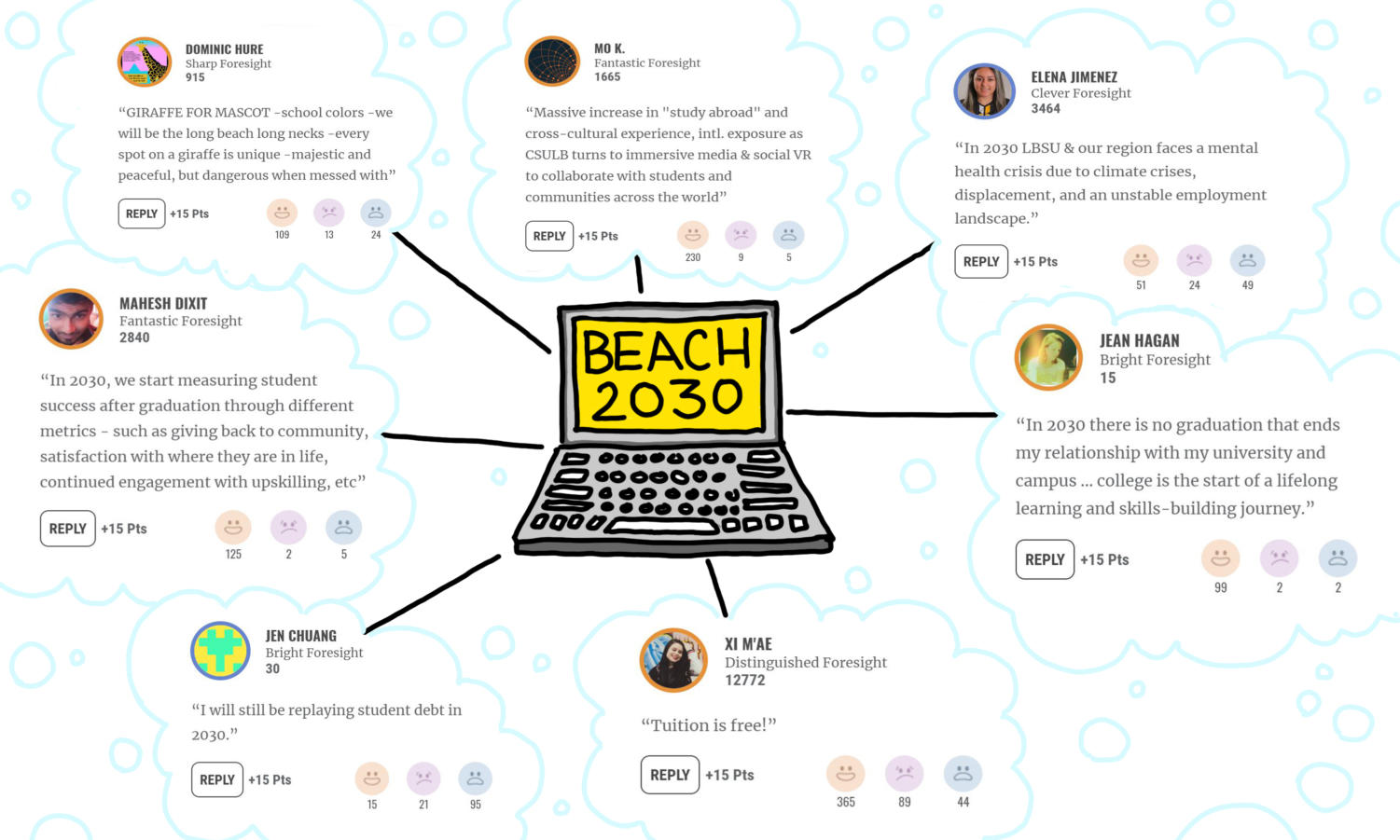Posts varying from discourse over the introduction of an e-sports association to the appointment of a giraffe as the new mascot with the hashtag #LongBeachLongNecks filled the feed of users engaged with the Imagine Beach 2030 online event Wednesday.
Through Imagine Beach 2030, students, faculty and community members all over campus sat at computers, sharing and exploring different ideas for what they want Long Beach State to look like in 2030.
Partnering with Institute for the Future, a company that helps organizations plan for the future, LBSU launched Imagine Beach 2030, a two-day online event that garnered input from the city and campus community.
Over 12,480 posts and responses had been made by 2,344 people as of 9 p.m. Wednesday night.
The two-day event is the first phase in a two-year “futures thinking” project called Beach 2030 Vision Map and Strategic Plan.
Participants receive “points” for responding and posting on the dashboard. They can also “add a signal” to posts, which are links to articles or videos that relate to the content of the post.
Popular posts appear on the dashboard in categories like “Everyone’s Talking About…,” “Super-Interesting Cards,” “Most Wanted Futures” and “Most Uncertain Futures,” among others.
Students contribute to Beach 2030 by “playing cards.” The two “card” options are named Positive Imagination, which are meant for hopes and dreams for LBSU, and Shadow Imagination, which are meant for concerns relating to LBSU’s future.
One post about the mascot became one of the most trending posts in Beach 2030. Written by Dominic Hure, the post said, “GIRAFFE FOR MASCOT -school colors -we will be the long beach long necks -every spot on a giraffe is unique -majestic and peaceful, but dangerous when messed with.” The post got 109 positive votes and 101 replies. Promotional flyers donning “Giraffe 4 Mascot” also appeared around campus.
The most popular post, written by Xi M’ae said, “Tuition is free!” and got 365 positive votes and 192 replies. The forum-style interface allows for replies to other replies. One criticism from Rabinia Woodstock to the comment said, “Nothing’s ever REALLY free- how do you think it would get paid for?,” which solicited even more responses.
Associated Students Inc. President Genesis Jara said she imagines by 2030, the university will accommodate marginalized communities and students at risk of homelessness and food insecurity.
“I imagine a future where the state has developed a sustainable funding model for the CSU system so that all students can obtain an affordable degree,” Jara said. “I imagine a future where our students don’t have to go hungry just to attend class. I imagine a future where students don’t have to be homeless to get a degree. I imagine a future where students of color and of marginalized communities face no systematic barriers and are able to afford and obtain their degree.”
Some campus members found the process to be counterproductive with some responses including content completely unrelated to the future of the campus.
“While the overwhelming number of responses is encouraging, I am a little afraid that many good ideas will get lost in the crowd,” said Curtis Bennett, dean of the College of Natural Sciences and Mathematics.
The School of Art Concerned Students of Colors and Allies argued that LBSU has a lack of transparency and that they feel ignored by administration. They pointed to the firing of Kimberli Meyer as one issue of concern and said they are unconvinced the Beach 2030 initiative will benefit the group in any way.
“LBSU [administration] doesn’t need this initiative to plan for 2030, they know what must be done: implement anti-racist policies and implicit bias trainings school wide; denounce white-supremacy through actions not just words; hire diverse tenure-track faculty and staff committed to social justice; sustain ethnic, women and gender, and queer studies programs and majors; sustain and fund the Humanities,” the group said in an email to the Daily 49er.
Douglas Domingo-Foraste, Long Beach chapter president of the California Faculty Association, doesn’t agree with the university’s implementation of the Institute for the Future platform to facilitate discussion.
“My feeling is that the medium itself has become the message,” Foraste said in an email to the Daily 49er. “That we’re using the Institute for the Future (IFTF) to run this process is, in itself, disturbing. Instead of writing and reading and debating cogent argumentation about the university’s future direction, we tweet and retweet. Hence the McLuhan reference. I swear this process is being run by the HAL 9000.”
President Jane Close Conoley said she hopes the initiative helps increase engagement with both the city and the campus community.
“We have various milestones, you have to get engagement and want to get people talking,” Conoley said. “I want to make sure we do it in a way that at the end of the process, people say “not only are we moving in positive some directions but my voice was heard.”
Students and community members can visit the Beach 2030 website to share their thoughts. The last day to participate in Beach 2030 is Thursday, Nov. 15.
Watch our video coverage of the event here:
VIDEO | Paula Kiley & Zulema Suarez




